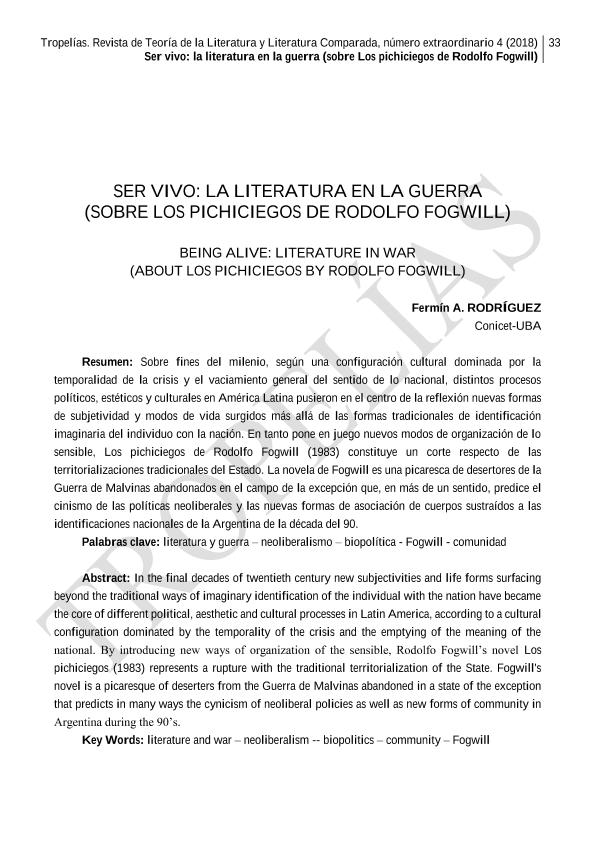Artículo
Sobre fines del milenio, según una configuración cultural dominada por la temporalidad de la crisis y el vaciamiento general del sentido de lo nacional, distintos procesos políticos, estéticos y culturales en América Latina pusieron en el centro de la reflexión nuevas formas de subjetividad y modos de vida surgidos más allá de las formas tradicionales de identificación imaginaria del individuo con la nación. En tanto pone en juego nuevos modos de organización de lo sensible, Los pichiciegos de Rodolfo Fogwill (1983) constituye un corte respecto de las territorializaciones tradicionales del Estado. La novela de Fogwill es una picaresca de desertores de la Guerra de Malvinas abandonados en el campo de la excepción que, en más de un sentido, predice el cinismo de las políticas neoliberales y las nuevas formas de asociación de cuerpos sustraídos a las identificaciones nacionales de la Argentina de la década del 90. In the final decades of twentieth century new subjectivities and life forms surfacing beyond the traditional ways of imaginary identification of the individual with the nation have became the core of different political, aesthetic and cultural processes in Latin America, according to a cultural configuration dominated by the temporality of the crisis and the emptying of the meaning of the national. By introducing new ways of organization of the sensible, Rodolfo Fogwill’s novel Los pichiciegos (1983) represents a rupture with the traditional territorialization of the State. Fogwill's novel is a picaresque of deserters from the Guerra de Malvinas abandoned in a state of the exception that predicts in many ways the cynicism of neoliberal policies as well as new forms of community in Argentina during the 90’s.
Ser vivo: la literatura en la guerra (Sobre "Los Pichiciegos" de Rodolfo Fogwill)
Título:
Being alive: literature in war (about Los Pichiciegos by Rodolfo Fogwill)
Fecha de publicación:
10/2018
Editorial:
Universidad de Zaragoza
Revista:
Tropelías
ISSN:
1132-2373
Idioma:
Español
Tipo de recurso:
Artículo publicado
Clasificación temática:
Resumen
Palabras clave:
LITERATURA Y GUERRA
,
NEOLIBERALISMO
,
BIOPOLÍTICA
,
FOGWILL
Archivos asociados
Licencia
Identificadores
Colecciones
Articulos(SEDE CENTRAL)
Articulos de SEDE CENTRAL
Articulos de SEDE CENTRAL
Citación
Rodriguez, Fermin; Ser vivo: la literatura en la guerra (Sobre "Los Pichiciegos" de Rodolfo Fogwill); Universidad de Zaragoza; Tropelías; 4; 10-2018; 33-53
Compartir
Altmétricas




